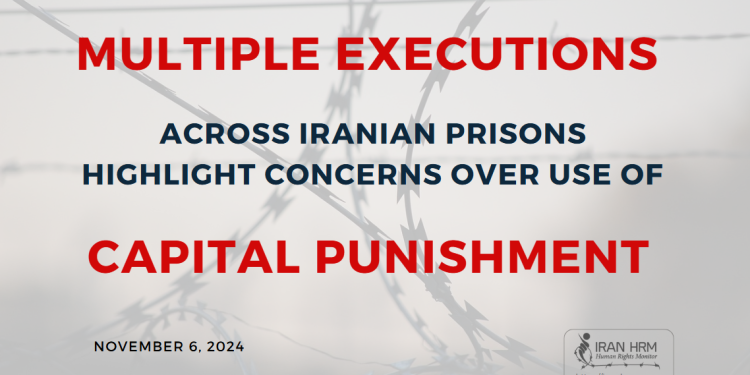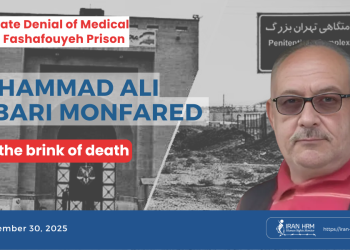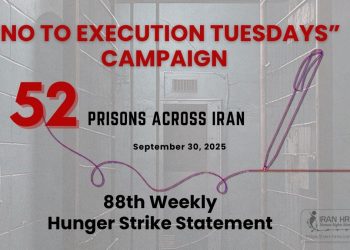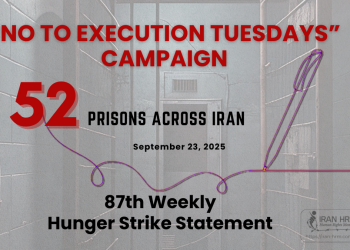“In the dimly lit corners of Iranian prisons, where silence holds the weight of lives lost, documenting each execution is a daunting act of resistance. These executions—hidden, rapid, and relentless—reveal a disturbing increase in the use of capital punishment. Iran’s pervasive crackdown, with escalating numbers and stories of lives cut short, calls for urgent international accountability. Behind every case is a plea for justice that was denied, a transparency that was evaded, and a human rights system increasingly under siege.” — written by Iran HRM researchers who document these reports
Introduction
In recent days, Iran carried out a series of executions across various prisons, raising significant human rights concerns about the country’s continued use of the death penalty. The executions took place between October 29 and November 6, 2023.
Execution of Arvin Ghahremani in Kermanshah
On the morning of Monday, November 4, 2024, a prisoner named Arvin Ghahremani was executed in Dieselabad Prison in Kermanshah, Iran. Gahremani, a young Jewish man, was detained two years ago on murder charges following a group altercation. His family made considerable efforts to obtain consent for compensation from the victim’s family to halt the execution, but their appeal was denied. Gahremani was 18 years old at the time of the incident.
Gahremani’s legal proceedings were marked by ambiguity and a lack of transparency. His court-appointed attorney reportedly failed to mount an effective defense, and Gahremani’s own attempts to save the victim’s life were not accounted for in his case. Witnesses claimed the deceased was the initial instigator of the altercation.
Executions in Tabriz, Arak, Ahvaz, and Qom
On Thursday, October 31, 2023, authorities in Tabriz Prison executed Abolfazl Shahbazi, a prisoner from Ahar who had been detained for five years on murder charges. Just days later, on Sunday, November 3, Ashkan Asgari, a 29-year-old from Khomein, was executed in Arak Prison following three years of imprisonment for murder.
On Tuesday, October 29, 2024, two inmates in Qom Prison, Ali Mostafavi and Hossein-Ali Maleki, were also executed. Both men, reportedly from Malard, had been convicted in a shared murder case. Meanwhile, on Saturday, November 2, authorities at Sepidar Prison in Ahvaz carried out the execution of Gholam-Ali Shakerian, who had been held for a year on murder charges.
In an especially prolonged case, Hassan Ekhlasi, aged 35, was executed on October 31 in Zahedan Central Prison after spending 14 years in detention. Reports indicate he was arrested in 2011 for allegedly committing a murder with a knife in 2008 when he was near the age of 18, raising concerns about the possibility that he was a juvenile at the time of the crime.
Increased Activity in Isfahan and Pending Executions
On October 31, Hamed Dowsti, a 35-year-old detained five years ago for murder, was executed in Isfahan Prison. Human rights observers report that more than 70 inmates in this facility are currently awaiting execution.
Additionally, authorities have recently transferred other inmates to solitary confinement in preparation for imminent executions in Urmia and Qom prisons. On Saturday, November 2, Kazem Alilou was moved to solitary confinement in Urmia Prison to prepare for his execution on murder charges, and Ali Qolibeigi was transferred under similar circumstances in Qom.
Executions in Yazd, Jiroft, Hamadan, and Other Locations
At dawn on Tuesday, November 5, five prisoners were executed across multiple prisons. Three inmates in Yazd Prison were executed after being moved to solitary confinement on Sunday, November 3. Among them was Mohsen Nejadi-Moghaddam, a 30-year-old from Rigan with two children, who had been convicted of drug-related charges after his arrest in 2021.
In Jiroft Prison, authorities executed Aref Kamali, who had been held for seven years on murder charges, while Hamadan Prison executed Hamed Mehraban, a 38-year-old detained six years ago on murder charges. Another inmate in Hamadan, Daryoush Saeedi, 32, was executed on Sunday, November 3, for a murder committed during a group altercation five years earlier.
Executions in Shiraz, and Kahnuj
In Shiraz’s Adelabad Prison, two men, Alireza Jamshidi and Mohammadreza Sotudeh, were executed at dawn on Monday, November 4. Both had been convicted of murder in separate cases. Additionally, Kahnuj Prison carried out the execution of Mansour Rastaakhiz on drug-related charges, while a second prisoner, Yousef Ahmadi, was also executed, though his execution was initially misreported as having taken place in Minab.
Executions in Ghezel Hesar Prison in Karaj
At dawn on Wednesday, November 6, 2023, four inmates were executed in Ghezel Hesar Prison in Karaj. Two of the individuals, Mostafa Sarlak and Mohammad Hossein Bayat, had been convicted of murder and sentenced to death. The other two executed inmates, identified as Mohammad Tajik and an individual named Sadegh, were Afghan nationals who had been charged with rape.
Mass Execution in Mashhad and Other Cases
Reports indicate that six inmates were executed in Vakilabad Prison in Mashhad on Tuesday, November 5, including Mahmoud Shahreki and Mohammadreza Davar, both from Zabol, and two Afghan nationals. All four were reportedly charged with drug-related offenses, while details of the remaining two individuals’ identities and charges were not disclosed.
Additionally, on Tuesday, November 5, Yakub Narouyi, a 26-year-old father of three from Golestan province, was executed in Zahedan Central Prison on drug-related charges.
This recent series of executions reflects a sharp increase in capital punishment cases across Iran. Iran HRM calls on the international community—particularly the United Nations and the European Union—to take prompt and decisive action to address these human rights violations. An independent investigation into extrajudicial executions in Iran is essential to hold the regime accountable for its actions.







